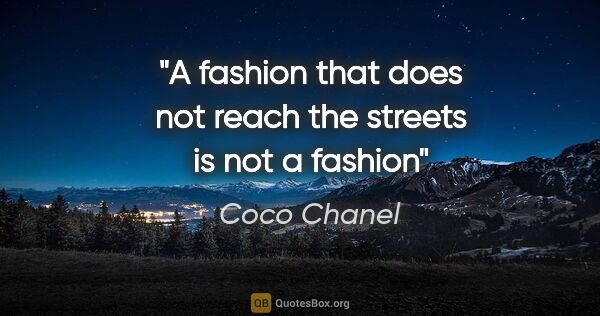Street Quotes (page 27)
And when you do find this letter, you know what? Something extraordinary will happen. It will be like a reverse solar eclipse - the sun will start shining down in the middle of the night, imagine that! - and when I see this sunlight it will be my signal to go running out into the streets, and I'll shout over and over, "Awake! Awake! The son of mine who once was lost has now been found!" I'll pound on every door in the city, and my cry will ring true: "Awake! Everyone listen, there has been a...
Doug Coupland
I do think free will is sewn into everything we do; you can't cross a street, light a cigarette, drop saccharine in your coffee without really doing it. Yet the possible alternatives that life allows us are very few, often there must be none. I've never thought there was any choice for me about writing poetry. No doubt if I used my head better, ordered my life better, worked harder etc., the poetry would be improved, and there must be many lost poems, innumerable accidents and ill-done...
Robert Lowell
Some three or four years before this Dr. Sloper had moved his household gods up town, as they say in New York. He had been living ever since his marriage in an edifice of red brick, with granite copings and an enormous fanlight over the door, standing in a street within five minutes' walk of the City Hall, which saw its best days (from the social point of view) about 1820. After this, the tide of fashion began to set steadily northward, as, indeed, in New York, thanks to the narrow channel in...
Henry James
Carrying his books from one life into the next was nothing new to Zuckerman. He had left his family for Chicago in 1949 carrying in his suitcase the annotated works of Thomas Wolfe and Roget's Thesaurus. Four years later, age twenty, he left Chicago with five cartons of classics, bought secondhand out of his spending money, to be stored in his parents' attic while he served two years in the Army. In 1960, when he was divorced from Betsy, there were thirty cartons to be packed from the shelves...
Philip Roth
In Tereza’s eyes, books were the emblems of a secret brotherhood. For she had but a single weapon against the world of crudity surrounding her: the novels. She had read any number of them, from Fielding to Thomas Mann. They not only offered the possibility of an imaginary escape from a life she found unsatisfying; they also had a meaning for her as physical objects: she loved to walk down the street with a book under her arm. It had the same significance for her as an elegant cane from the...
Milan Kundera
